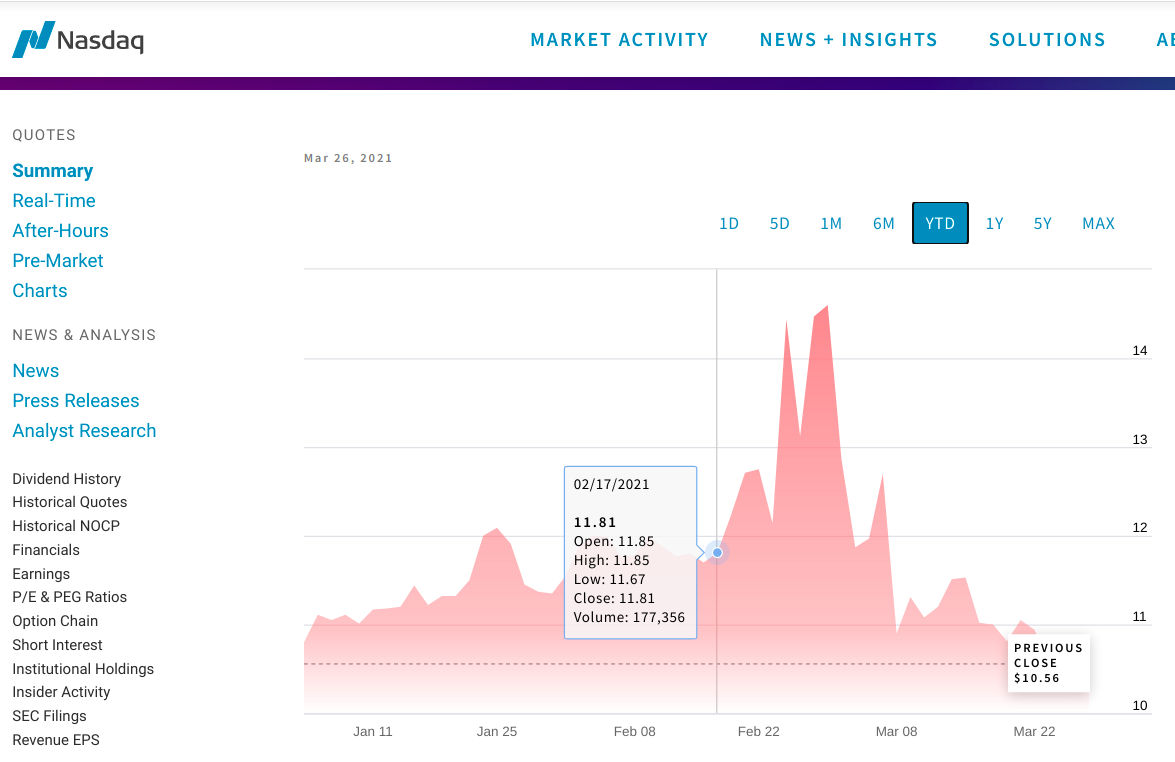Quantum Computing, Good Investment, 10 years from now
Most quantum computing experts believe that quantum computing won't be profitable for at least 10 years, if ever. (see, for example, Professor Scott Aaronson's concurring opinion about this in the references below). They believe this for sound technical reasons: because for quantum computers to be competitive with current classical computers, they will first have to achieve "fault tolerant quantum error correction" for a large number (millions) of physical qubits. The technologies required to achieve this are still a distant pipe dream. Recently, a fledgling quantum computer company called IonQ was acquired by a SPAC with stock ticker symbol DMYi. IonQ's initial valuation is $2B. Jeepers! Above is the DMYi stock price chart, as of today, March 27, 2021. DMYi's stock price is cratering so far. Click here for the latest chart provided by NASDAQ's website.
excerpt from IonQ document
https://ionq.com/posts/december-09-2020-scaling-quantum-computer-roadmap
“By 2023, IonQ will deploy modular quantum computers small enough to be networked together in a datacenter, and by 2025, we expect to achieve broad quantum advantage.
At IonQ, we are building the world’s most powerful quantum computers to solve the world’s hardest problems. Our recently announced 32 qubit system is expected to feature 22 Algorithmic Qubits, and this system is but the first of three new systems already in development. In short, we’ll be reaping the benefits of quantum much sooner than most would think.”
Quantum computing startups have a notorious track record of hype, dishonesty and unethical behavior. Some have even elevated people who committed scientific fraud (by doctoring their experimental data), practiced or condoned plagiarism, and been Jeffrey Epstein enablers (See references below). So you shouldn’t believe everything they say without careful analysis. I think most quantum computing experts believe that the above excerpt makes unrealistic promises. IonQ may be able to ship an appliance within that timeline, but will it be competitive with current classical computers? I seriously doubt it. They haven’t published any scientific papers that would lead me to believe otherwise.
Scientists have been working on fusion reactors and a cure for cancer, for at least half a century. In both those cases, they grossly underestimated the time it would take them to iron out the kinks from a technology. Magic Leap also had a multi-billion dollar valuation, but they failed miserably, and their technology was off-the-shelf, while a lot of IonQ's technology has never been built or tested before.
In 10 years, anything can happen.
- A new industry leader might emerge (very likely),
- a technology completely different from that being used by IonQ, might prove better. At least a dozen alternative technologies are currently being tried. For example, PsiQuantum has been working in stealth mode with funding of about $500M, on a room-temperature photonic quantum computer which they claim will beat the socks off IonQ's qc. See Reference below. Second example: Intel/QuTech and RIKEN/Japan are making swift progress on a quantum computer that uses tried-and-true silicon technology instead of ion-traps. See References below. Assuming they work, those 2 examples that I just mentioned will be much more SCALABLE than ionQ's device. IonTrap quantum computers are extremely difficult to scale up. The problem is that you have to create a *quantum* network with a huge number (10 thousand to do Shor’s algo) of these ion trap devices, and this has never been done before. With other qc technologies, quantum networking of 10 thousand macroscopic devices is not necessary. (Read more about qc scalability in the comments),
- you might want to use the money to buy a house,
- the stock market could crash,
- a new pandemic might arise,
- you could be investing in CRISPER and stem cells and 3D printing of houses and AI and green tech, all of which are producing a profit and fixing civilizations ills TODAY, not in ten years.
There are much easier, quicker and less risky ways to make a profit. Anyone who invests in a stock that is predicted to make its first profit 10 years in the future, is not the sharpest knife in the drawer. IonQ investors are The Lambs of Wall Street
References
- https://www.scottaaronson.com/blog/?p=5387
- https://qbnets.wordpress.com/2021/02/12/tudelft-quantum-computing-fraud/
- https://thetech.com/2021/02/25/mit-administration-epstein-op-ed
- https://www.scottaaronson.com/blog/?p=5387
- https://blog.computationalcomplexity.org/2021/04/quantum-stories.html
- https://www.reddit.com/r/QuantumComputing/comments/n6saia/globalfoundries_upgrades_for_silicon_photonics_in/
- https://qutech.nl/2021/05/12/cryo-chip-overcomes-obstacle-to-large-scale-quantum-computers-copy/
- https://scitechdaily.com/quantum-computing-breakthrough-entanglement-of-three-spin-qubits-achieved-in-silicon/


Comments
Post a Comment